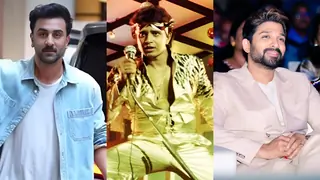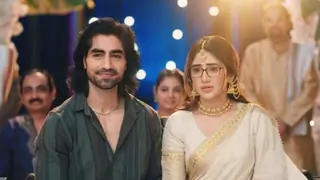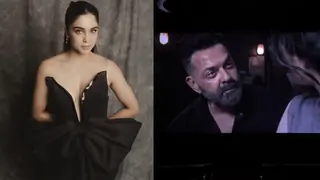============================================================ ===================
V A N R A J B H A T I A
40 Years in music,and counting!
Vanraj Bhatia, 71, has composed 100 jingles for each year of his chequered life. He's been a composer in the complete sense of the word for the last four decades, composing Western Classical works, musical scores for plays, films, TV, radio, events and A/V films. He is also on the panel of various awards and institutions and has picked up prestigious awards in India and abroad.
It is Vanraj Bhatia who, way back in 1959, composed the first-ever original music score for an Indian ad. film. "The product was Shakti Silk sarees, I remember," says Vanraj. "For the first time in an Indian ad. there was different music for the girls entering a saree shop, the girls leaving the shop their feeling the texture of the saree and so on."
Rewinding to a day of a typical Mumbai downpour in the '59 monsoon, Vanraj recalls how he had seen the ad film a day earlier and had to record the score between seven and 10 in the morning at Famous Studios, Tardeo.
"Tina (Durga Khote) who was the ad. film producer picked me up and we somehow landed at the studio after a walk in knee-deep water. So did the musicians and the recordist. But there was no way the projectionist could come in! And I had to compose the music based on my memory of the film I had seen earlier. The next day, my mother came to me in a panic. They have called you for a re-recoding, she said. I too was tense. I called up Tina and she said, you have no idea how well your music has jelled with the scenes. The clarionet actually seems to follow each turn of the sarees! And then I realised that re-recording in our terminology, meant the final mixing, Not doing the whole thing all over again!"
It is this uncanny incident which finally convinced Vanraj that he was meant to be in films. "Background scoring is all about calculations and timing but what is much more important is what you don't calculate. It meant that I had subconsciously breathed with the film," remembers Vanraj. It was a natural gift, an instinctive flair. After this Vanraj has done over 7000 jingles, and the count is on. "They are my bread and butter," he says with quite emphasis.
But Vanraj Bhatia's film work is no less outstanding. Besides doing virtually all of Shyam Benegal's films (whether they had songs or not) from Ankur in 1974 to Sardari Begum (1997), he has worked with Shashi Kapoor (36 Chowringhee Lane, Kalyug, Junoon, and the background score for Ajooba), Kumar Shahani, Saeed Mirza, Vinod Chopra (Sazaye Maut, Khamosh), Prakash Jha, Vijaya Mehta, Kundan Shah, and Govind Nihalani. "Art films and I seem to jell," he says.
Yet, Bhatia isn't a stranger to commercial films, having done the background scores for the recent China Gate as well as Pardes (which won him an award from Zee TV), Damini, Ghatak, Himalayaputra, Bandish, Chamatkar, Bekhudi and Beta, besides serials like Khandaan, Lifeline, Tamas, Discovery of India and Wagle Ki Duniya.
What is the difference between composing the background music for art films and commercial films? "Essentially commercial films need music which is larger than life. The visuals and even the dialogues depend a lot on the background music to create the requisite dramatic impact. So all these films end up having too much music if you ask me! In art films, the highlighting is not needed, as the scenes are conceived to stand on their own," says the maestro. "For Sardari Begum I readied twelve songs in 5 days. The background music for China Gate took 50 days!"
With his vast background in both Indian and Western music, what does he think of his generation of music composers who run down Western influences in films? "I detest this kind of purism," says the composer. "In India, nothing is pure; there is a melange of influences in literature, architecture, art and music. We are a melting-pot of influences, thanks to so many invasions. I come from Kutch and the races there are all mixed for the same resaon. You cannot criticise influences, they are going to come in. Isn't the khayal originally from Persia? If we can imbibe so much from the Mughals, why can't we do so from the west? India adapts everything in its own way whether it is art, music or even the English language and dress. We don't become alien, do we? Does any of our English singers sound like Michael Jackson?" he thunders.
"Jo dil ko saccha lagaa, accha lagaa, that's good. What comes naturally has to be good. I loved Aati kya Khandala, I loved Ek do teen; they sound so fresh. Why else did they capture everyone's imagination? It is when you begin to do something which doesn't spring naturally from you that you cheapen music. Like those awful remixes which massacre lovely originals. They are so hideous!".
With his liberal views, why doesn't he try even now to do a commercial film? "I am game," he says, "but are there any takers? You see, no one's realised the obvious fact that the ad agencies and manufacturers crave for me since my jingles help sell the product because they are catchy enough to be hummed by even the bhaiya from Bihar and UP? They transcend age and geographical and cultural boundaries. I have done that successfully for 40 years. Isn't that exactly what our mainstream composers do in feature films compose songs with universal appeal?"
But why can't he prove himself with a basic album? "I am trying to do exactly that," says Vanraj. "Sony Music has approached me for a pop album with a new singer from Bengal. Mehboob is writing the lyrics and seven of the ten songs are ready. It will be mainstream pop, but not the kind of junk which is often churned out in the name of pop."
Ever the non-conformist and iconoclast, Vanraj hates getting lyrics written to his tunes. "What is a song if not words?" he asks. "The music comes in relation to the sentiments. You have to feel the words, get inside them and then compose a tune which seems to jell. Then you polish it up. I can never make multiple tunes for one song. That's amateurish! If you approach a lyric cerebrally, you will know which tune fits. Do any of my songs ring false in relation to the mood and situations? Because of my experience in jingles, I have developed the art of composing directly in the studio most of the time. I hate doing homework, or bringing my work home!"
And when we think of his creations like Raah mein bichhi hain palkein (Sardari Begum), Tumhare bin jee na lage ghar mein (Bhumika) and his first recorded film song, Mero gaam kaatha paare (Manthan), Ishq ne todi sar pe qayamat (Junoon) and Piya baaj pyaala piya jaaye na
(Nishant), one has to agree that Vanraj Bhatia knows what he is talking about .





















